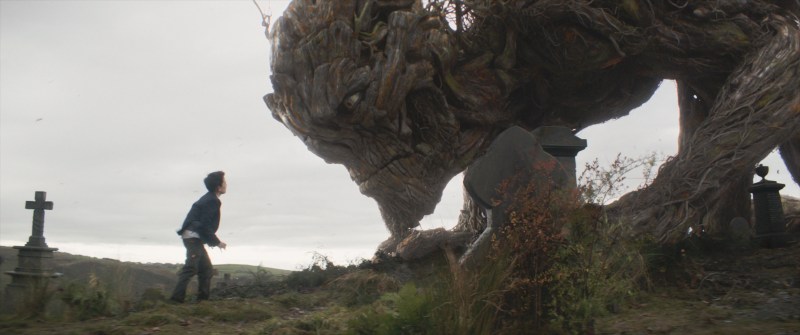There’s a Key and Peele sketch where the pair play hotel valets, shooting the shit about Liam Neeson movies during some downtime. They run through his filmography, detailing his characters’ most unrealistic stunts and most badass lines with comic enthusiasm, delightedly postfixing an “s” to his name throughout. “Homie was straight face-changing. Now that’s just Liam Neesons acting right there.” It’s a short, absurd dialogue that ends with the valets combusting from the mere thought of a movie starring both Neeson and “Bruce Willy.” Throughout “A Monster Calls,” every time the Monster spoke, I couldn’t help but think about that sketch. “Did you see the Liam Neesons movie with the Monster, though? The one where he was the Monster? That’s just Liam Neesons, dog.”
Let’s start here. Executionally speaking, “A Monster Calls” is phenomenal. The movie tells the story of Connor, a British teen whose mother Lizzie is dying of cancer. Young protagonists often start low, but Connor starts lower: He’s bullied at school, his father lives a continent away with a new family and his grandmother can’t understand him (and won’t even try). And then things get worse: He wakes up from a nightmare one night, visited by a branch-limbed Monster. The Monster demands four meetings with Connor, three to tell its stories and a fourth where Connor must tell his own story to the Monster. The Monster threatens that Connor’s story must be honest. Connor resists, but the Monster traps him in its grasp and forces him to listen.
So the Monster tells Connor its stories: postmodern fairy tales without heroes or villains, whose only moral is that the world is often unjust. Meanwhile, Lizzie’s sickness worsens, his father visits and leaves, his bullies intensify their cruelties and Connor must face the truths he’s buried underneath his pain. He must tell the Monster his story.
Lewis MacDougall, Felicity Jones and Sigourney Weaver play Connor, his mother and his grandmother, respectively – and each one of them brings nuance, authenticity and depth to their archetypal roles. Terminal illness is gravitationally melodramatic, and in less capable hands, “A Monster Calls” might have been reduced to a saccharine parable. But Felicity Jones isn’t just a pure, dying mother; she loves Connor and she’s suffering, but she’s also young, confused and in denial. Sigourney Weaver isn’t an outmoded harpy, but a mother herself too pained to be kind. And Lewis MacDougall’s restrained portrayal of Connor is so tangibly real that when the shadows inside him finally surface, we’re neither surprised nor disappointed.
And Liam Neeson – the incomparable Liam Neesons – plays the Monster. The Monster is a contradictory entity: primal and eldritch yet nurturing and wise, dangerous but also paternal, a creature whose true nature is necessarily obscure. And Liam Neeson captures the full range of this delicate maelstrom in a performance without affectation or apparent effort, capturing the enigmatic and awesome nature of this fantastical creature by simply speaking in his Irish baritone.
So why, watching this tense, meticulous drama, couldn’t I get that stupid Key and Peele sketch out of my head? On the surface, “A Monster Calls” is the diametric opposite of the high-octane action movies that Neeson usually helms. Liam Neeson doesn’t even physically appear in the movie, outside of a fleeting cameo.
But underneath the surface, the Monster isn’t really so different from Neeson’s archetypal badass – both are mysterious and paternal, with menace, trauma, and power seething beneath their surfaces. And ontologically speaking, the world of “A Monster Calls” and those of Neeson’s usual thrillers are also actually quite similar. Both are driven by ugly truths of human nature we’d rather not openly acknowledge, truths we might rather die than admit. And ultimately, my distraction speaks to the contradiction at the heart of “A Monster Calls”: despite having all the trappings of a children’s movie, “A Monster Calls” is very much not for children.
Like the Monster’s fairy tales, this movie has no moral. There are no bad guys (there aren’t really even any good guys) and there’s no winning. The movie is about loss and pain and fear and regret, about humankind’s basic cowardice and weakness. It’s about harsh truths that are best hidden. And for adults, “A Monster Calls” is a serious drama without the confections that adult dramas usually promise. There’s no sex, violence, sweeping landscapes shot or any other type of escapism. There’s just raw struggle in the guise of a small boy and a tree-monster.
As a children’s movie too dark to edify, and an adult drama too pure for escapism, “A Monster Calls” is destined to be alien. Still, to me, all that only makes “A Monster Calls” even more precious. Its story is uncompromising and humble and violently true to itself, and its production is impeccable. In an industry dominated by comic book movies, thrillers, and comedies – fleeting, relentlessly formulaic fare with no expectation of permanence – “A Monster Calls” is vitally inventive and authentic. For better and worse, “A Monster Calls” is a book brought literally to life.
Contact Allen Wu at nalkpas ‘at’ stanford.edu.
